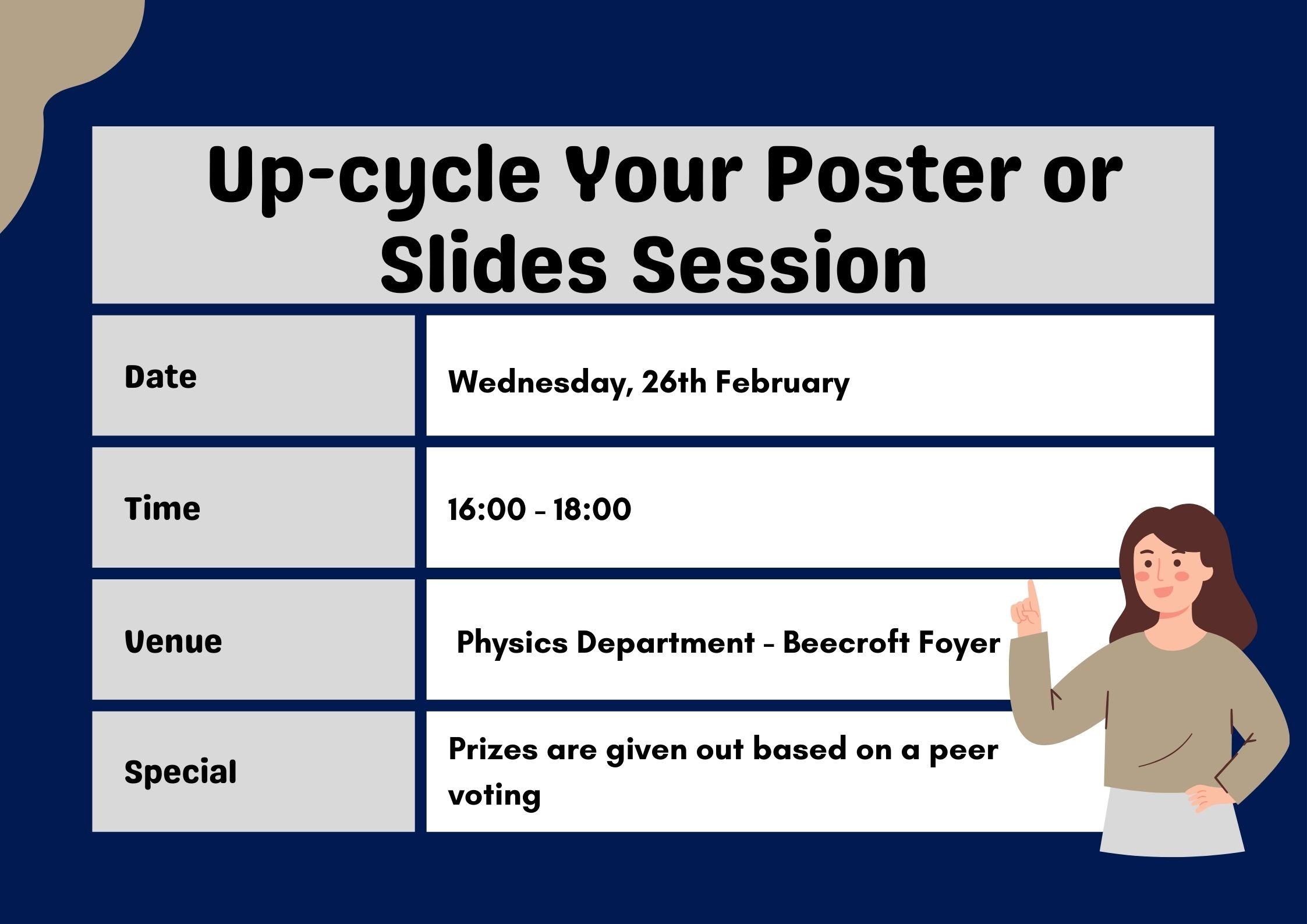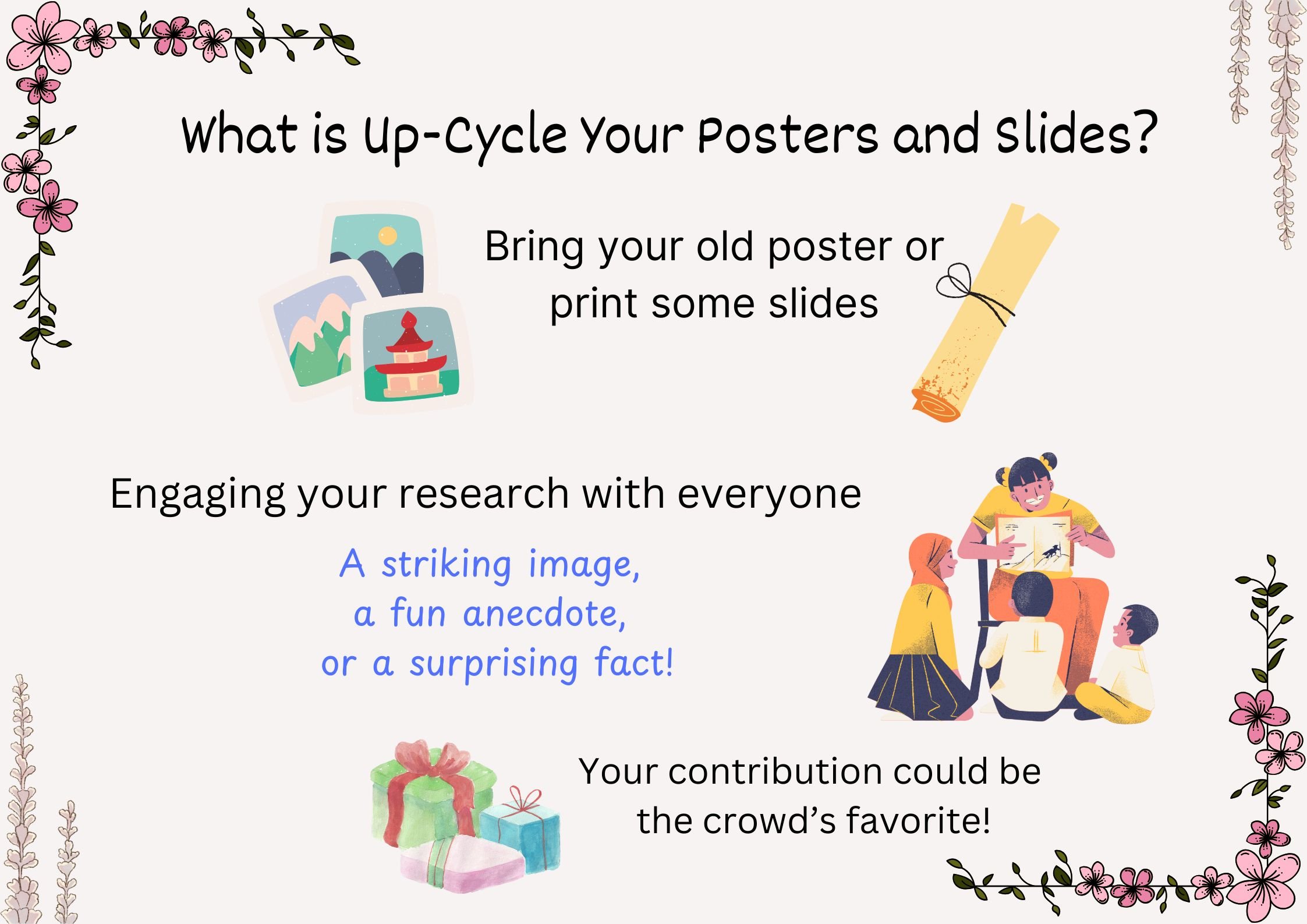 Image 1 of 2
Image 1 of 2

 Image 2 of 2
Image 2 of 2



Up-Cycle Your Posters and Slides 25HT
Share your recent scientific contribution - a poster or a printed selection of slides from a talk - with your fellow Clarendon Scholars!
📅Date and Time: Wednesday, 26th February,
16:00-18:00
🏠Venue: Physics Department - Beecroft Foye
A twist on conventional poster sessions:
Choose your old poster or print some slides from your latest talk
Get creative and add what makes people (from other fields) engage with your research: a photo, an anecdote, you choose!
Bring your contribution along, share it, vote on your favourite and - get votes…
... Don’t miss your chance to win prizes - your contribution may well be the crowd's favourite
The event will take place in the Beecroft Foyer Physics Department & not only prizes, also food and drinks will be provided!
List of posters:
Influenza A Virus: Hijacking the Cell's Cleanup Crew
Mirudula Elanchezhian - Biology
Imagine the cell as a bustling city, where autophagy is the clean-up crew, clearing out trash and debris. My research uncovers how the influenza A virus sneaks into this process, hijacking the clean-up crew to its advantage. I’ll be sharing how viral proteins like NS2 and M2 disrupt the cleanup, leaving the city vulnerable.
Aligning Curriculum, Pedagogy, and Assessment in Practical Science for future-oriented science education
Lin Li - Education
Preparing students for an uncertain, complex future requires thoughtful alignment of curriculum, pedagogy, and assessment. This study aims to inform future-oriented science education policies by addressing the crucial question: How can we balance these three elements to foster student motivation, creative thinking and critical thinking?
Although inquiry has long been a cornerstone of science education, its effective enactment remains a persistent challenge. For instance, in Singapore, a recent shift in the A-Level Science curriculum encourages the use of more open-ended investigative tasks. While many educators welcome the inquiry approach to traditional confirmatory tasks, others have raised concerns regarding its feasibility, alluding to the challenging nature of conducting inquiry in the laboratories. This presentation highlights a theoretical framework that supports teaching and learning for fruitful development of lifelong skills in our next generation.
Modelling extremely sparse graphs
Valentin Kilian - Statistics
We present a novel class of CRM models that include rapidly varying CRMs. The CRM is constructed as a mixture of generalised gamma CRMs, has a simple expression, interpretable parameters, and includes the generalised gamma and stable processes as special limiting cases. We also present a simple size-biased construction for the CRM. To facilitate posterior inference on extremely sparse graphs, we adapt the Caron-Fox Hamiltonian Monte Carlo algorithm, which we use to analyse network properties of real data sets.
Share your recent scientific contribution - a poster or a printed selection of slides from a talk - with your fellow Clarendon Scholars!
📅Date and Time: Wednesday, 26th February,
16:00-18:00
🏠Venue: Physics Department - Beecroft Foye
A twist on conventional poster sessions:
Choose your old poster or print some slides from your latest talk
Get creative and add what makes people (from other fields) engage with your research: a photo, an anecdote, you choose!
Bring your contribution along, share it, vote on your favourite and - get votes…
... Don’t miss your chance to win prizes - your contribution may well be the crowd's favourite
The event will take place in the Beecroft Foyer Physics Department & not only prizes, also food and drinks will be provided!
List of posters:
Influenza A Virus: Hijacking the Cell's Cleanup Crew
Mirudula Elanchezhian - Biology
Imagine the cell as a bustling city, where autophagy is the clean-up crew, clearing out trash and debris. My research uncovers how the influenza A virus sneaks into this process, hijacking the clean-up crew to its advantage. I’ll be sharing how viral proteins like NS2 and M2 disrupt the cleanup, leaving the city vulnerable.
Aligning Curriculum, Pedagogy, and Assessment in Practical Science for future-oriented science education
Lin Li - Education
Preparing students for an uncertain, complex future requires thoughtful alignment of curriculum, pedagogy, and assessment. This study aims to inform future-oriented science education policies by addressing the crucial question: How can we balance these three elements to foster student motivation, creative thinking and critical thinking?
Although inquiry has long been a cornerstone of science education, its effective enactment remains a persistent challenge. For instance, in Singapore, a recent shift in the A-Level Science curriculum encourages the use of more open-ended investigative tasks. While many educators welcome the inquiry approach to traditional confirmatory tasks, others have raised concerns regarding its feasibility, alluding to the challenging nature of conducting inquiry in the laboratories. This presentation highlights a theoretical framework that supports teaching and learning for fruitful development of lifelong skills in our next generation.
Modelling extremely sparse graphs
Valentin Kilian - Statistics
We present a novel class of CRM models that include rapidly varying CRMs. The CRM is constructed as a mixture of generalised gamma CRMs, has a simple expression, interpretable parameters, and includes the generalised gamma and stable processes as special limiting cases. We also present a simple size-biased construction for the CRM. To facilitate posterior inference on extremely sparse graphs, we adapt the Caron-Fox Hamiltonian Monte Carlo algorithm, which we use to analyse network properties of real data sets.
